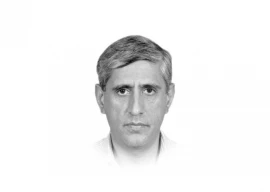
On the 27th of October, the Indian and Bangladeshi governments unveiled their newest collaborative venture: a biopic directed by renowned Indian filmmaker and former Member of Parliament, Shyam Benegal. This biopic depicts the life and journey of Bangladesh’s Founding Father, Sheikh Mujib-Ur-Rahman. However, the timing of the film’s release, 48 years after the political leader’s assassination, and the joint effort between both the nations raise a pertinent question: why now?
The current socio-political dynamics in both India and Bangladesh may offer insight into the film’s timing. Currently, both countries are on the cusp of their upcoming elections in 2024. Bangladesh is witnessing widespread protests against the government of Sheikh Hasina, many of which are calling for her immediate resignation. However, this discontent is not new.
Sheikh Hasina, who is serving her fourth term in office, has long faced allegations of authoritarianism and suppressing dissent voices using undue force. Accusations of electoral manipulation in 2014 and 2018, purportedly with Indian support, have also been a key point of contention, with international actors such as the EU and the US also expressing their concern. Despite these challenges, Sheikh Hasina has maintained considerable public support, in part due to her lineage as the daughter of Bangladesh’s revered founding father as well as due to the economic leaps made during her leadership. However, the recent economic decline signals a potential shift in popularity, as evidenced by the ongoing protests which could impact her upcoming election campaign.
The release of the biopic at this critical juncture could very well be seen as an effort to reignite public support by evoking the legacy of the revered founding father. Portraying Sheikh Mujib Ur Rahman’s struggles, the film aims to emotionally connect with viewers, drawing parallels between his journey and the current challenges faced by his daughter.
The involvement of the Indian government in a film centred on a Bengali political figure also sparks valid questions. Yet, a closer look reveals the potential factors behind India’s vested interest in this collaboration. Bangladesh stands as India’s fourth-largest trading partner and one of the biggest markets for Indian exports. It also serves as a key access point to the Bay of Bengal, a critical area for shipping routes connecting the eastern and western hemispheres, enhancing its strategic importance for India.
While Bangladesh has always held strategic importance for India, it has only been amplified under the BJP rule. Bangladesh has become a cornerstone of the BJP’s ‘Neighbourhood First’ policy. The close ties maintained by Sheikh Hasina’s Awami League play a crucial role in preserving these relations, as seen by the signing of seven MoUs in 2022 alone, aimed at improving bilateral relations. This close bond between the two governments has become particularly valuable to the BJP-led India at a time where controversial policies such as the Citizenship Amendment Act are contributing towards growing criticism and unpopularity of the BJP among Bangladesh’s Muslim majority population. An unpopularity may have severe consequences for India’s hegemonic goals in the region if it influences Bangladeshi citizens to instead vote in favour of the opposition Bangladesh Nationalist Party, which has been largely perceived to have an anti-India stance as well as a closer relationship with China compared to its Awami League counterpart.
In light of this, the release of the movie, Mujib: Making of a Nation, serves as an attempt to not only rekindle popular support for Sheikh Hasina but also as a poignant reminder of the shared history between India and Bangladesh. Representing India’s support for Bangladesh during the 1971 War, the film seeks to rouse nationalistic fervour in support of Sheikh Hasina’s leadership as the spiritual successor to her father’s legacy, as well as to continuation of close ties with India.
Published in The Express Tribune, November 14th, 2023.
Like Opinion & Editorial on Facebook, follow @ETOpEd on Twitter to receive all updates on all our daily pieces.




1728127649-0/BeFunky-collage-(2)1728127649-0-165x106.webp)
1727242355-0/Diddy-(1)1727242355-0-165x106.webp)








COMMENTS
Comments are moderated and generally will be posted if they are on-topic and not abusive.
For more information, please see our Comments FAQ